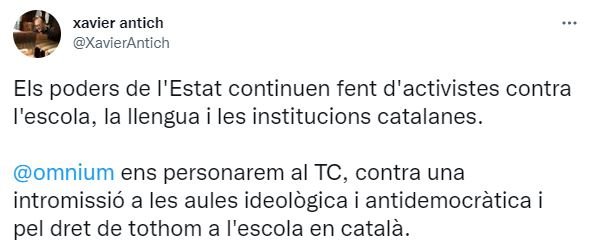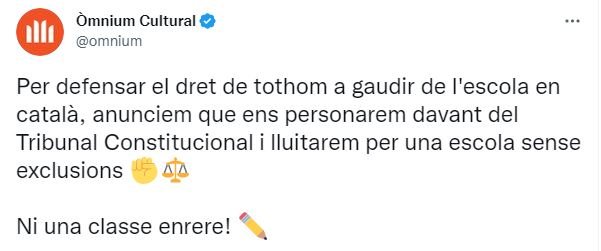Minutes after it transpired that the Spanish Constitutional Court is to examine the possible unconstitutionality of the two Catalan laws passed in recent months that have avoided the imposition of a 25% Spanish language quota in Catalan schools, Òmnium Cultural has announced that it will appear before the court to "defend the right that everyone has to have schooling in Catalan". "We will fight for a school without exclusions", the Catalan cultural organization said in a tweet. The president of Òmnium, Xavier Antich, declared to social media that "the powers of the state continue acting as activists against Catalonia's school system, language and institutions". As a consequence, Antich stated that the civil society organization he leads will make a case to the Constitutional Court as an affected party and in defence of the "students and families of Catalonia" in this case: "It is an ideological and anti-democratic intrusion into the classrooms". Therefore, says Xavier Antich, they are taking this action in support of "everyone's right to schooling in Catalan".


Earlier this Wednesday, it was announced that the Constitutional Court had accepted the question of unconstitutionality presented to it by the High Court of Catalonia (TSJC) against the decree law approved on May 30th that prevents the imposition of quotas and percentages of language use in schools. Specifically, that decree law refers to the "non-application of numerical parameters, proportions or percentages in the teaching and use of languages". The TSJC chamber responsible for executing the decision imposing a 25% Spanish quota took the issue to the Constitutional Court, claiming that it had doubts about the legality of the new regulations, since they did not match the official status of Spanish in schools. The Catalan court considered that establishing "the non-application" of percentages in language projects in schools gave "preference" to Catalan. Looking further, it also raised a question of unconstitutionality against the second new language law passed in Catalonia this year, that on the use and learning of official languages which was passed in Parliament in addition to the government's decree law. The three political parties of the Spanish right, the PP, Cs and Vox, had previously presented this appeal of unconstitutionality, which was accepted for processing in September.
Legitimacy of taking part in case
Òmnium, which plans to present its written argument to the Constitutional Court this week, will argue that the major Catalan cultural organization is an affected and interested party in the debate on the unconstitutionality or not of the new regulations in educational centres, which were passed by a large parliamentary majority. The cultural body previously made its case for being an interested party before the TSJC over the enforcement of the ruling for the 25% quota of classroom time in Spanish, although it had not initially been a party in the case. However, in the hearing, the TSJC only accepted the appearance of the Assembly for a Bilingual School (AEB), the language pressure group which had brought the original claim, on the basis that it represented the families of schoolchildren, as well as defending the Spanish language, while rejecting the legitimacy of Òmnium, despite the fact that it certified that it represented 42 members with children of school age, in addition to defending Catalonia's own language. The organization, led by Xavier Antich, stated in July that a failure by the court to admit Òmnium as an affected party would be "a flagrant violation of the right to effective judicial protection, and especially the right to a legal hearing" for the Catalan cultural organization and the families it represented in the case - a claim it will now also make before the Constitutional Court.
In that case before the Catalan High Court, the judges rejected Òmnium, as well as two other groups, the Associació Plataforma per la Lengua-Collectiu l'Esbarzer (Catalan language ONG and specific neighbourhood collective), and the teaching trade union USTEC-STEs, asserting that they were all "defending generic positions" - the defence of the Catalan language and the non-execution of the sentence - when, the court argued, the issue under debate was the application of vehicular use or not of Spanish. Subsequent to this hearing, the execution of the 25% Spanish quota was stopped by the new Catalan government regulations.
Incompatibility of ruling with new laws
In fact, in July the TSJC admitted that it could no longer apply its ruling requiring schools in Catalonia to teach a minimum of 25% of teaching hours in Spanish. The judges noted the "impossibility" of executing the sentence because it had entered into contradiction with the new legislative package that had been approved by both the government and the Catalan Parliament, although they already at that point raised doubts "about its validity due to unconstitutionality" . For this reason, they turned to the Constitutional Court, given that they understood that this new linguistic model "did not allow the position of Spanish to be reconstructed in parallel with that of Catalan without committing a legal fraud". The incompatibility of the new laws with the 25% ruling, they asserted, is "complete because it responds to a different model." That is to say, for the TSJC, it is not sufficiently guaranteed that Spanish is a vehicular language in the Catalan schools.

